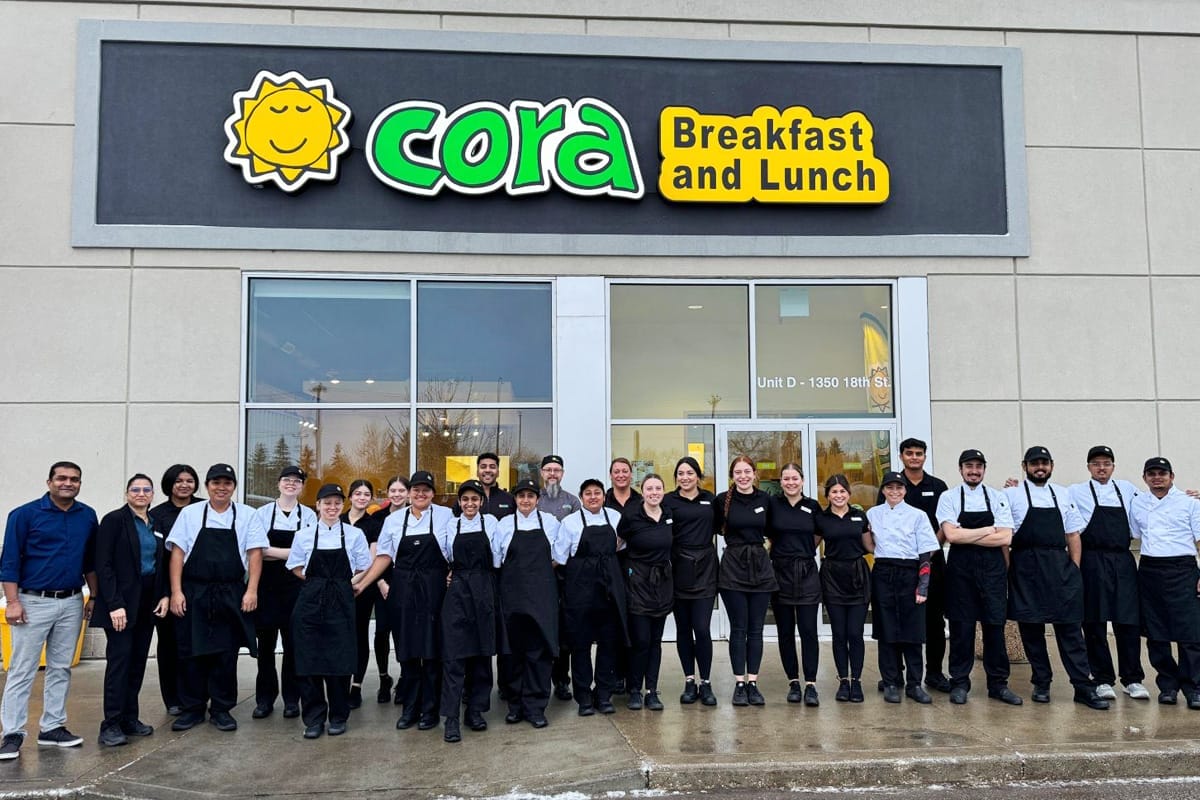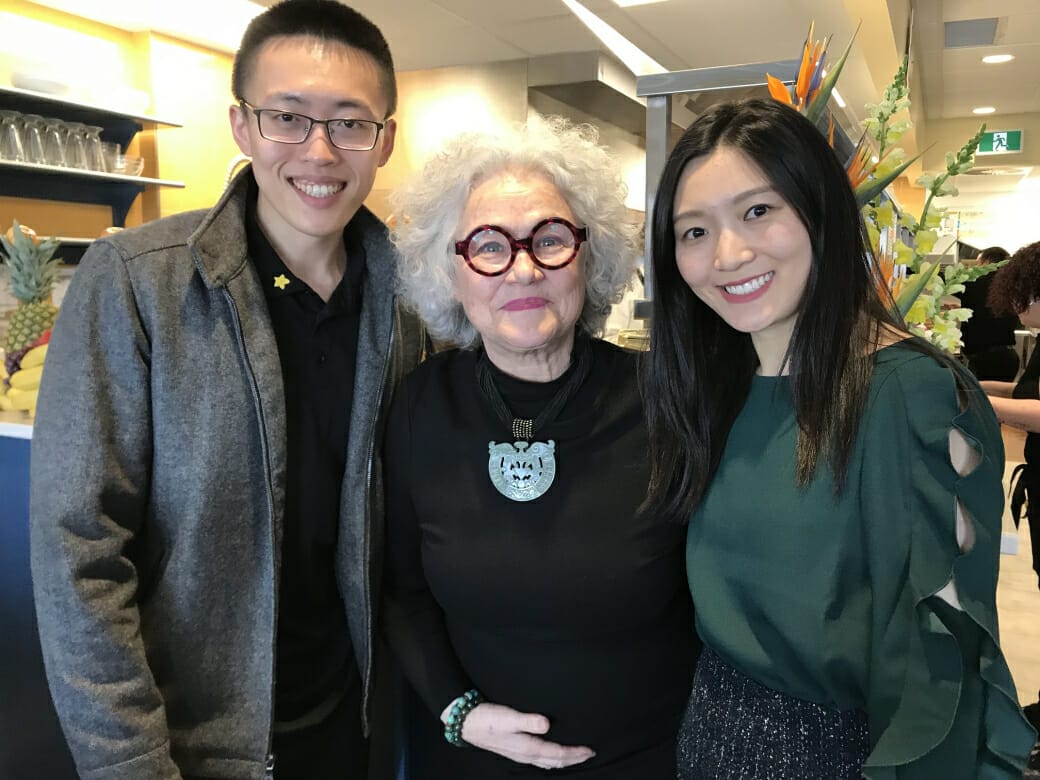Mme Cora's letter
See all letters

December 28, 2025
Goodbye
My dearest, my most cherished readers,
The time has come for me to put down my fountain pen and end the Sunday letters. This wonderful adventure came into my life as unexpectedly as the pandemic – the event that started it all. With the majority of our restaurants forced to close temporarily, we were looking for a way to stay connected with our customers. And that’s how I came to write these letters to you every week.
I started with a letter of encouragement (It’s going to be OK), followed by a few recipes you could make at home since you were trapped inside your home too. I recounted how some of our most popular dishes came to be. I wrote about our business and the Sun that has illuminated nearly half of my life and continues to brighten my days. I was running out of professional stories to tell, but prompted by your thousands of comments, I unlatched my heart and the floodgates of my memory opened. From then on, the ink flowed freely. Nearly six years ago, I offered you the first cup of Sunday morning coffee with a plate of words carefully chosen and embellished.
And now, after all this time, the writer has emptied her bag and used her most beautiful words. I’ve transported you into my secret garden, and you have visited it all. I have told you everything. Fruit is obliged to hang onto the branch; ripe fruit, however, must detach itself and fall into the void like an olive or a fledgling from its nest. My heart is heavy as I say GOODBYE to you. This letter, this beautiful Sunday letter, will be my last.
The business is keeping me very busy lately. Maybe you’ve seen the news? We’re in the midst of redefining our brand image. You’ll notice a change to our menu sleeves, new ingredients, a few new dishes, including breakfast pizzas, and, yes, even mocktails! My favourite one is the Spicy peach margarita. Do try it, it’s delicious! Our team worked with architects to reimagine the restaurant design so that it reflects our new brand image and our desire to better meet the needs of our wonderful clientele. In Quebec, the Cora location on Boulevard Le Carrefour is the first one to feature our new look. In Alberta, you can see it in Evanston (Calgary), and soon in Garneau (Edmonton).
Between time at the office and meetings with friends at the coffee shop, I’m also immensely privileged to be able to spend time with my children, my grandchildren and my great-grandchildren. I want to make the most of it and bake them cookies, including molasses cookies, and replenish my jam supplies, which will certainly be gone after the holidays! Time goes by so quickly. It has slipped through my fingers with such speed that I haven’t noticed that nearly six years have passed. Before my hourglass is empty, I want to hold back the last grains of sand and savour them as long as I can if Providence permits.
Should inspiration come to me from the beak of my friend the crow, or should a cunning fox whisper a few soft words, I won’t hesitate to put their messages on paper and share them with you. Our encounters will be happy surprises, unexpected mornings filled with a bit of my poetry.
I want to thank you from the bottom of my heart. I want to tell you 307 times THANK YOU – that’s the number of letters I’ve written to you over the years. In fact, my love for you is immeasurable, and my gratitude vastly exceeds 307 thank-yous. Thank you for your kind words, your warm encouragement, the smiles you’ve put on my face, the intellectual nourishment you’ve provided and for your presence, as if you were constantly by my side.
When I retired from the business, I missed our customers’ love. The thanks-yous, the gratitude I heard or saw in the delighted expressions of those sitting around the restaurant tables. I found them again in your comments. Still today, I’m totally astounded that sometimes more than 200,000 people were reading my letters each week. Imagine for a moment just how much your 200,000 tokens of love warmed my poor lonely heart! I found a sense of accomplishment because of you and received the affection that, as you know, I was so hungry for as a child, teenager and wife.
My dearest, most cherished readers, THANK YOU. Continue to say hello if our paths should cross. Please know that you will always hold a very special place in my heart.
Cora
♥️
A word from the journalist friend who always asked a 1,001 questions…
I had the privilege of accompanying Mme Cora for approximately 250 of her 307 letters. She gave me the title of “journalist” in her stories. In truth, I was the editor, whose passion for words, writing and reading is equal to the wonder she feels for them. I read her letters and shared my feedback with her.
I encouraged her to share a particularly juicy detail or difficult story. I clearly remember the morning when she told me the story about her grandmother, the owner of a brothel. “Mme Cora, you must write that letter,” I told her! She categorically refused. It took me over a year to convince her, but finally she agreed to it! During our exchanges, she often confided anecdotes that eventually would make their way to you, in these Sunday letters. I recall the story about her forced abortion when she lived in Greece; the afternoon when she unexpectedly met Paul, her teenage crush, at the library; her misadventures with potential suitors she met through the matchmaking agency; the time when Husband burnt all her notebooks; that dreadful morning when he slapped Gigi and Mme Cora knew that the time had come to leave; her love for thrift stores and flea markets; her uncontrollable desire to purchase and read books; her passion for brightly coloured clothes and assorted eyeglass frames; and so many more stories that she had the generosity to divulge to me. I will forever cherish the moments I spent with her, and I know that she’ll do just the same. You were the most precious thing in her heart when she saw you at the restaurants, and she was elated with every comment you left.
In my view, when Mme Cora wrote her letters – all 307 of them – she never held back. She told her life story in detail, with frankness and passion. She first put all her love into preparing and serving thousands of breakfasts, and then she wrote these Sunday letters that she offered with the same genuine affection and boundless desire to delight.
Thank you for accompanying her on this alphabetical odyssey, this lexical promenade she put together especially for you.
Isabel P. Picard
♥️

December 21, 2025
La magie des Fêtes
When I was a child, the holidays were nothing special in my family. School was out, we could play in the snow and visit Grandpa Frédéric as much as we liked, but there were no Christmas Eve celebrations and no piles of gifts under the tree. Magic was never part of the holidays. It’ll come as no surprise to you by now, but I never saw Mommy kissing Santa Claus, and she didn’t hug Daddy under the mistletoe either.
Later on, my kids brought a bit of magic to the bitter cold of winter. I’d take them out to admire the elegantly decorated department store windows and the twinkling lights on the Christmas trees. At home, because of Husband’s habit of gambling at the card table, there were rarely any gifts under the tree.
I still remember the time I brought my young kids to a shopping centre filled with people running left and right, their arms full of purchases wrapped in shiny, festive wrapping paper. You should have seen how surprised we were when we saw Santa in the middle of the food court seated on a big, red throne, covered in red velvet cushions. A row of poinsettias stood at attention at his feet. The only thing we could make out in this mass of red was Santa’s long white beard, his moustache and his bushy brows, as white as freshly fallen snow.
My daughter pulled my sleeve to ask the identity of the beautiful lady whose gloved hands were resting on Santa’s shoulder. My oldest son explained to his sister that she was the Christmas fairy who hands out candy to children. After waiting in line to meet Santa for a good long hour, each child finally received a mini candy cane in the palm of their hand.
We were poor at that time, but we felt happy after seeing Santa. The kids drank hot cocoa, three tiny marshmallows floating in the sweet beverage. It warmed my heart to see their beautiful smiles, each one adorned with a frothy moustache. They begged me, of course, to buy them fries, burgers, a slice of pizza or other small food court treat so they could believe, just for a moment, that they were like all the other kids in our neighbourhood. Instead, I had to promise them Kraft dinner – “a real one!” as my oldest used to say – in order to finally get them to leave the shopping centre. Food became a unifying and comforting theme for us.
My friend Eric, the chef I’ve already talked to you about, spent an entire day at my place a few weeks ago helping me to prepare spinach puffs and tourtières. I spent an afternoon stuffing dolmas. My fudge is just waiting to be taken out of the freezer and popped into appreciative mouths to melt on their tongues. On Christmas Eve morning, I’ll prepare my fried eggplant that will join the turkey, tourtières, pork stew, cipâte, baked beans and veggies, including gently braised broccoli, served with my special secret sauce. About 20 people will be sitting at the table in my big kitchen, and we will feast. It’s magical every time.
Whether you are surrounded by family or friends this holiday season, I wish you your fill of food and joy. The happiest moments are not necessarily the most expensive ones. The holiday magic happens when we spend time making memories with those who are dear to us, and when we allow ourselves to wonder at the world with childlike hearts.
Happy holidays to you, dear readers!
Cora
❤️
Read more

December 14, 2025
Drifting dream of hope
Every time I get close to a body of water, no matter how big or small, pond or sea, I can’t resist the urge to send a message in a bottle. It’s another way to communicate after all, and, who knows, maybe one day my prince of the sea will find my letter in its glass envelope. Let me tell you about the last time I poured my heart and hope into the sea.
When I arrived in Percé one beautiful summer afternoon, I knew immediately I’d send a message, especially since the hotel where I was staying had put me in a pretty room steps from the sea, with a big patio door overlooking the famous rock. The location was idyllic, making it the perfect place to write a message to a potential knight in shining armour. But what would I tell him? So many years separate us, and perhaps continents. Would I write in French, in English, in Greek or in German? Should I draw red hearts interspersed with twinkling stars?
I had to think about it. I crossed the hotel lawn and walked a few steps to the seashore. I sat on a weather-worn log and soaked my feet in the sea. In the sky, a thousand seagulls were whirling and trying to answer me. The wisdom of the water reminded me that I had already written a letter about Plato’s theory, recounting the perilous journey of soulmates. He claimed that humans as we know them today are incomplete half-beings – constantly trying to recognize and find their other half in order to be happy. I don’t believe in this philosophical myth, but the truth is, I have never met my true “soulmate.” Every time I am near the sea, however, I feel at home, I become bolder and I am tempted to send my message in a bottle. Who knows what a kind-hearted cod, somewhere in the depths of the sea, might do for me?
Back in my room, I decide to write a poem to my knight of the waves. Using my red ink fountain pen, red like passion, I write it down on a nice crisp sheet of white paper. An obliging waiter at the hotel had given me an empty bottle of Sauvignon blanc with a blue twist cap. I let it soak in hot water in the tub while I write. After I’ve finished writing, I peel off the two labels from the bottle, clean the surface and rinse and meticulously dry the inside with the room’s blow dryer. I cut a strand of my white hair and lay it on the paper. I roll up my hair in the poem and carefully slip my hope into the beautiful forest green bottle. The next morning, before leaving for Gaspé, I return to the dock in L’Anse-à-Beaufils with my precious glass sailboat. Everything is perfect and, my heart filled with anticipation, I muster the courage to ask an old sailor about to leave land to kindly take my bottle out to sea and throw it into the water. “Of course!” I will never forget the kind sailor’s smile as he quickly took my bottle and placed it next to his heart. He wished it a safe journey to its destination.
Here is my poem to my soulmate:
MY HEART IN A GLASS PRISON
I was born tearful, for I had left you.
Where we were joined in love, united.
Did we walk here together through this tunnel?
By Zeus, now I am alone, forbidden and punished.
My weeping eyes fumble for you.
Where are you? In what mysterious depths?
Three new breaths came out of me.
Three reasons I wish for better attire.
I managed, and managed well at that.
Clinging to work, so far from your fingers’ reach.
You are always there, in my head, looking for me.
Me, your beloved, your beautiful other half.
I imagine you are both talkative and serene.
Can you hear in the distance my heart in turmoil?
I long to find you and hear your voice.
May you find me as beautiful as before.
My walled heart combs the bottom of the seas.
May you find my bottle in the sea.
May you break this glass prison and console me.
When I think of my soulmate, my mind disconnects, and my intelligence stops working temporarily. I imagine my bottle drifting, then travelling thousands of kilometres across the seas before finally washing ashore on a deserted beach where an old sailor in tall boots just happens to be looking for mussels for his supper. An old dreamer, I’m incapable of giving up on true love. I close my eyes. I hear the mussel shells clattering in the boiling pot. I smell the aroma of the bread my gallant hero has put in the oven. In his peaceful haven, I look for the utensil drawer, a tablecloth, two large bowls and two cups. When he turns to me, musical notes escape his lips and mute prose dances on the felted silence around our long-awaited encounter. His eyes twinkle like blue-purple stars. His hands are platters of abundance; his voice reminds me of the gentle song of the enchanting whale. His arms, strong and comforting, embrace me like two parallel docks. Between them I finally come to rest. My soulmate smells like the sea. His wrinkled neck looks like the exterior of seashells; his cheeks like driftwood polished by the waves.
I go to the window, and the ocean penetrates my heart. I desperately need to find this message in a bottle and deliver it to him myself. I’d like him to recognize me and know that I’ve been waiting for him forever. Since the dawn of time, love has been everywhere and yet it’s so difficult to spear.
Cora
♥️
Read more

December 7, 2025
The older I get, the less I cry
Could my heart be hardening or are my tear ducts drying up? I don’t remember the last time I cried. Dry eyes, dry skin, dry mouth and the invasive dryness of old age. Thank goodness, my ink still flows. For the longest time I washed my hair with the water I collected from the clouds’ tears, just like my mother used to.
When I was a child, I bawled for nothing and everything. I cried when my brother crumpled up my drawing, stole my eraser or chewed on my colouring pencils. I sobbed when he put strawberries in my basket without destemming them first and when he hid his marbles to keep me from playing with them. I remember my brother as some sort of Dennis the Menace before his time.
Mom cried in her room or on the shoulder of our neighbour Mrs. Berthelot when Dad’s job as a travelling salesman took him away on his business trips. During those years, misery looked like an Olympic-sized centipede capable of climbing anywhere.
When Dad came back on Friday nights and opened a bottle of beer while listening to Mario Lanza, our living room filled with sadness. I often wanted to dry the tears that fell on his big cheeks, but I didn’t. Our small bodies never got near the warmth of our parents. There were never any hugs, no endearments and no rewards that might have made us feel like we were good kids.
I guess our sorrows were washed into the sea when the tide went out, and we grew up like wild weeds on the side of the road, without tenderness or solid guidance. The absent love between our parents was like permanently living with a ghost in the room. I regularly heard them quarrelling late at night: my mother grumbled and my father wept. What else could I have done at that time but to believe in the cruel fate that governed our lives? I knew nothing about the important things a young girl should know as she enters adulthood.
I cried night and day in silence every single year I was married: when the mother-in-law criticized how I cooked, when my sisters-in-law talked behind my back, each time Husband forbade me to see my parents and almost every night once the kids were asleep. My eyes were constantly tearing up as soon as I found myself alone in the apartment, behind closed doors. Eventually, I escaped with the children, and it’s as if the sky cleared and all the clouds dispersed. I rebuilt my life on solid ground. Day after day, I started believing in miracles, angels, fairy godmothers and in the helping hand of a celestial power who exists to love humans.
My happiness now consists of dressing up the ordinariness of each day. Smile, lend a hand, acknowledge, give, pray, love and write. Writing to feed my lines, quench lonely hearts and ennoble my soul.
I write almost anywhere, but I prefer the coffee shop, surrounded by people. I hear the music of their soothing purring, and people send dozens of sweet hellos my way. One might think that the hustle and bustle of the place bothers me, but the opposite is true. I always have a smile on my face. Maybe it’s due to all those years I worked in restaurants. Whether cook or boss, I loved being surrounded by customers. I loved to please those sitting at our tables because I received compliments and thanks in return. The appreciation expressed by my customers compensated for the glaring lack of attention and love that had cruelly marked my life before.
The older I get, the less I cry. I learn to dedramatize my life, including even the smallest daily annoyances. I misplace objects; I lose my keys every other day, my sunglasses, my credit card holder, my grocery list and so on. I have my ways to foil my forgetfulness.
l move a bit slower than I used to. I think before I act; before leaving the house or coffee shop where I write, or heading off to the office twice a week.
Did I forget something? Where is my cell phone? This electronic telecommunication gadget is absolutely essential for me. If I lose it, I’ll definitely cry!
Cora
♥️
Read more









